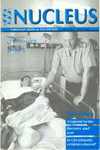Solomon’s shocking command was designed to evoke an emotional response of maternal horror. It succeeded in its aim, and the bizarre procedure was not performed. Nearly three thousand years later, a sophisticated surgical procedure which did literally ‘cut a living child in two’ was performed in November 2000 in Manchester. The tragic case of Jodie and Mary has led to public fascination, heated philosophical debates and complex legal argumentation. At the time of writing, Jodie remains in intensive care following surgery, but the long-term consequences for her and her family are completely unknown.
The occurrence of conjoint twins has been known since antiquity, but it is only in the last 10-20 years that surgical, anaesthetic and intensive care techniques have become available to attempt separation. Every pair of twins has a different anatomical structure and the surgical complexities and challenges are enormous. In the UK only Great Ormond Street Hospital has any significant experience, involving less than 20 cases. The centre in Manchester had never performed this kind of surgery before. So what has Christian thinking to say about this unusual and troubling case?
Firstly, when discussing complex medical ethical issues we must always remember that we are talking about human beings, not just case material for interesting discussions! Jodie and Mary are people like us, made out of the same flesh and blood. In Christian thinking they are ‘flawed masterpieces’, even if their problems and flaws are more obvious and unusual than most. We must try to identify with them and their family, trapped in this tragic dilemma which can only end in death. When faced by unusual congenital malformations there is always a tendency to adopt a ‘freak-show’ mentality. Christian thinking emphasises our common humanity - we are all the same under the skin.
Secondly, we must not sanitise what is unacceptable. There is a long-standing tradition in medicine to use sanitised words which mask the awful realities they describe. I am deeply troubled that both in the media descriptions of Jodie and Mary and in the philosophical and legal debates which followed, the painful reality of the proposed surgery was never described. Jodie and Mary were joined at the abdomen and shared a common aorta. Surgical ‘separation’ involved the literal dismemberment of the twins. A living head and upper torso was dissected and surgically removed, limbs were dismembered, the fused vertebral column was dissected and recreated, a huge surgical wound from the upper thorax to the perineum was created, the bowel exteriorised and a colostomy formed, the bladder reconstructed, and the pelvic geometry reformed. The procedure involved over 20 health care personnel and lasted nearly 24 hours. The end result of this outstanding experimental technological feat is a critically ill child who requires days of painful and unpleasant invasive support techniques in the intensive care unit, and an isolated collection of pathological specimens which are all that remains of a person called Mary. I write these words not to cause shock or distress, but simply to point out the troubling reality that lies behind those innocent words ‘surgical separation’. In an understandable desire to protect people from distress we may unintentionally mislead and end up distorting reality. As Christians we have to tell it like it is.
Thirdly, Christian thinking about medical intervention must always balance the benefits and the burdens of treatment. Twenty years ago surgery was not an option and symptomatic treatment was the only possibility. Now there are other options but just because an operation is technically feasible, it does not mean that it should be performed in every case. In this case the burdens of treatment on Mary, on Jodie and on the family are colossal. Even if she survives the acute post-surgical period, Jodie will face a series of unpleasant and painful surgical procedures throughout childhood. Do the benefits of separation genuinely outweigh these extraordinary burdens on all concerned?
Fourthly, Christian thinking sees the family relationships as a central factor. The legal analysis of this case was exclusively individualistic. How do we balance the rights of Jodie against the rights of Mary? But Christians see human beings as locked together in a web of mutual responsibilities and caring. How can we do the best for this tragic family in their distress and uncertainty? We should only use the force of law to oppose parents’ wishes in extreme circumstances - when it is absolutely clear that parents are not acting in their children’s best wishes.
Fifthly, is perhaps the most obvious point of all. In Christian thinking it is never right to kill one person so that another person may benefit. The ends do not justify the means. The secular philosophy of utilitarianism says that our aim should always be to maximise the sum total of happiness in the world. If by torturing one baby we can save the lives of 100 adults, there is no doubt what the utilitarian would recommend. But Christianity teaches that respect for the integrity and sanctity of every human life must be paramount. In Paul’s words we cannot ‘do evil that good may result’ (Rom 3:8).
Finally Christian thinking does not see death as the ultimate tragedy. In some cases of terminal illness and untreatable disability, death can be seen as a ‘severe mercy’ and even as a strange form of healing and restoration. In God’s grace death is a gateway into a renewed creation. It is no accident that palliative and terminal care was invented almost entirely by Christians! To allow a baby to die in dignity, pain-free and at peace in her mother’s arms, can be as much a triumph of modern medical technology as the most heroic surgery. The paradox is that it is our very respect for the value and integrity of human life which will sometimes lead us to say ‘No’ to the possibilities of modern technological medicine.































